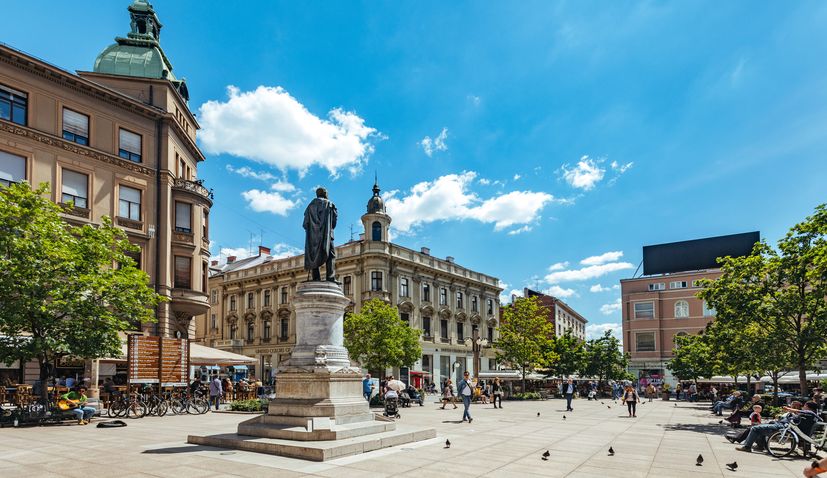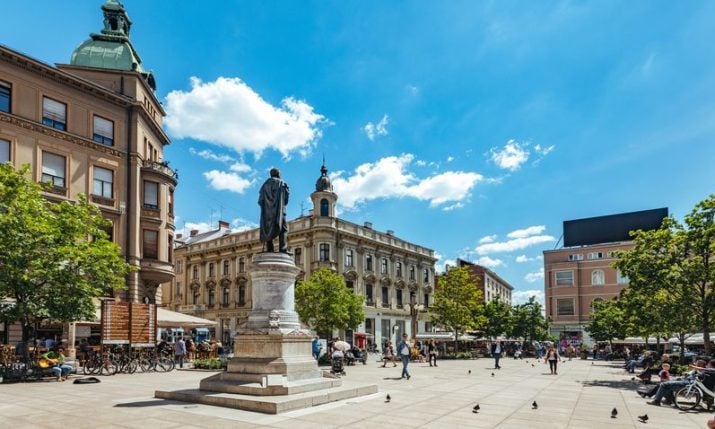
Trg Petra Preradovica, Zagreb (Photo credit: Marija Gasparovic/Zagreb Tourist Board)
ZAGREB, 5 Sept (Hina) – A substantial majority of Croatian citizens, at 79 per cent, believe that Croatia benefits from membership of the European Union, and half consider that things in the country are moving in the right direction, according to the latest Eurobarometer survey commissioned by the European Parliament.
Exactly half, 50 per cent, of those surveyed in Croatia believe that things in the country are headed in a good direction, which marks an increase of 16 percentage points compared to the previous survey conducted in January and February this year.
Those who believe things are going in the wrong direction account for 42 per cent, an 18-percentage-point decrease from the previous survey.
Croatians are more optimistic than the EU average: across the EU, 37 per cent think things in their countries are improving, while 52 per cent believe they are headed the other way.
Employment opportunities
The survey, conducted in May across all 27 member states, shows that a large majority of Croatians, 79 per cent, feel their country benefits from EU membership. That is six percentage points higher than the average of all member states.
The most cited benefit by Croatians, at 49 per cent, is new opportunities for work.
Equally, 32 per cent believe that the EU contributes to economic growth in Croatia, improves the standard of living, and helps maintain peace and strengthen security.
At EU level, the top benefit is maintaining peace and strengthening security (37 per cent), followed by improved cooperation with other member states (36 per cent), and economic growth (29 per cent).
Inflation, rising prices and cost of living
The greatest concern for respondents in Croatia, at 55 per cent, is inflation, rising prices and the cost of living. A further 41 per cent prioritise support for the economy and the creation of new jobs, while 31 per cent highlight the fight against poverty and social exclusion.
Inflation and cost of living are also the top issues across the EU, but at a lower rate of 41 per cent compared to Croatia.
More than half, 58 per cent, of respondents in Croatia think the EU is headed in the right direction, while 33 per cent think the opposite. Croatians again show slightly more optimism than the EU average, where 42 per cent believe the EU is going in a good direction, and 43 per cent think not.
As regards future expectations, 61 per cent of Croatians expect their standard of living to remain the same over the next five years, 22 per cent expect improvement, and 16 per cent foresee deterioration.
Older people more pessimistic
Optimism decreases with age. Among 15-24 year-olds, 44 per cent expect an improvement in their standard of living; within the 25-39 group, 34 per cent do; in the 40-54 bracket, only 20 per cent expect betterment; and among those over 55, just 12 per cent expect their standard of living to improve.
Looking at the EU’s future, 70 per cent of Croatians are optimistic, compared with 66 per cent across the EU.
Sixty-eight per cent of respondents in Croatia want the EU to have a greater role in protecting citizens during international crises and security risks.
A vast majority, 90 per cent, call on member states to respond collectively to current global challenges.
Meanwhile, 77 per cent think the EU needs more flexibility in rapidly changing geopolitical contexts, 37 per cent say the Union should focus on defence and security, and 32 per cent believe it should prioritise competitiveness, the economy, and industry to strengthen its global standing.

